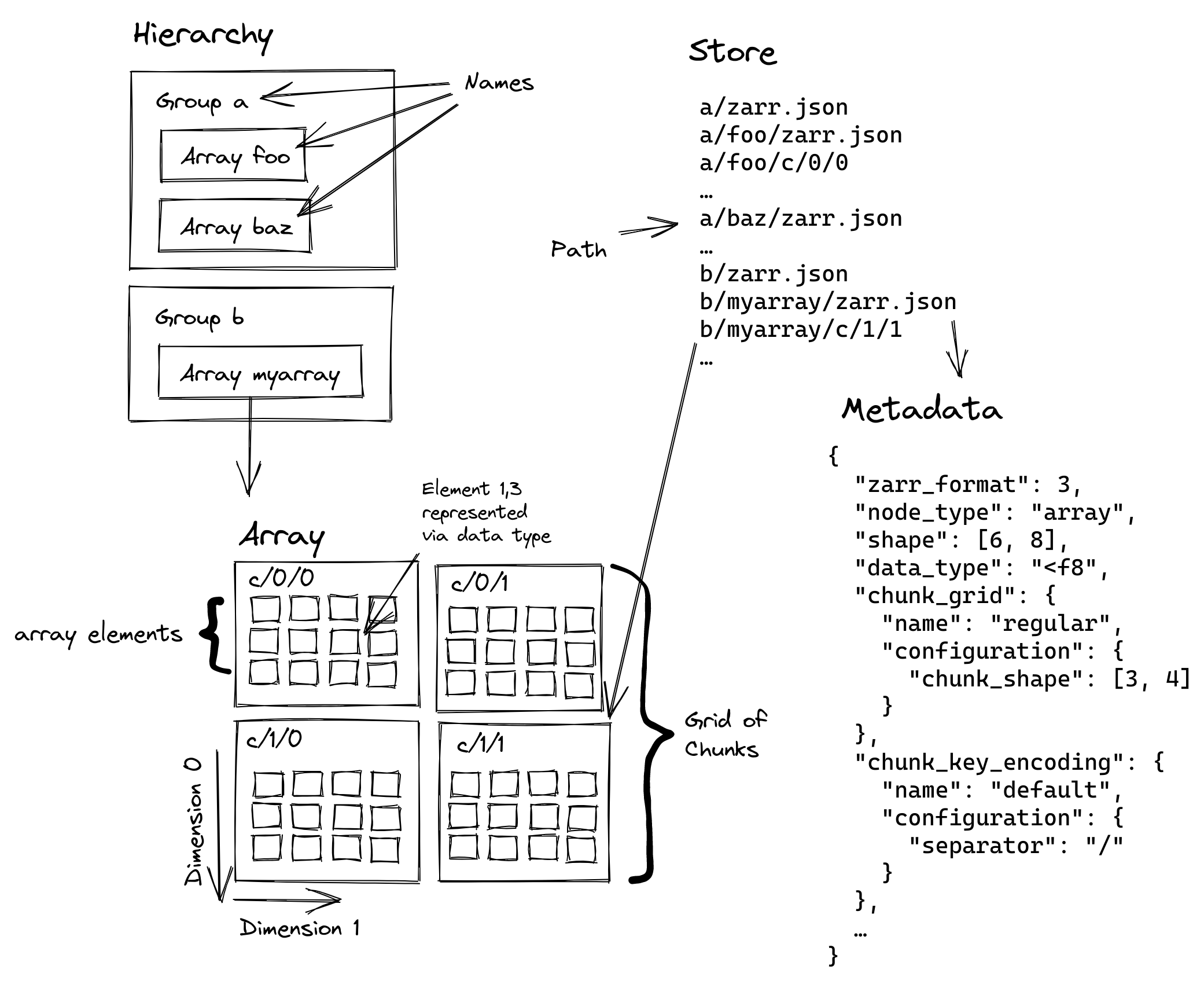Zarr Groups
A group is a node in a Zarr hierarchy that may have child nodes (arrays or groups).

Each array or group in a hierarchy is represented by a metadata document, which is a machine-readable document containing essential processing information about the node. For a group, the metadata document contains the Zarr Version and optional user attributes.
Opening an Existing Group
An existing group can be opened with Group::open (or async_open):
#![allow(unused)]
fn main() {
extern crate zarrs;
use zarrs::group::Group;
let store = std::sync::Arc::new(zarrs::storage::store::MemoryStore::new());
let group = zarrs::group::GroupBuilder::new().build(store.clone(), "/group")?;
group.store_metadata()?;
let group = Group::open(store.clone(), "/group")?;
// let group = Group::async_open(store.clone(), "/group").await?;
Ok::<_, Box<dyn std::error::Error>>(())
}Note
These methods will open a Zarr V2 or Zarr V3 group. If you only want to open a specific Zarr version, see
open_optandMetadataRetrieveVersion.
Creating Attributes
Attributes are encoded in a JSON object (serde_json::Object).
Here are a few different approaches for constructing a JSON object:
#![allow(unused)]
fn main() {
let value = serde_json::json!({
"spam": "ham",
"eggs": 42
});
let attributes: serde_json::Map<String, serde_json::Value> =
serde_json::json!(value).as_object().unwrap().clone();
let serde_json::Value::Object(attributes) = value else { unreachable!() };
}#![allow(unused)]
fn main() {
extern crate serde_json;
use serde_json::Value;
let mut attributes = serde_json::Map::default();
attributes.insert("spam".to_string(), Value::String("ham".to_string()));
attributes.insert("eggs".to_string(), Value::Number(42.into()));
}Alternatively, you can encode your attributes in a struct deriving Serialize, and serialize to a serde_json::Object.
Creating a Group with the GroupBuilder
Note
The
GroupBuilderonly supports Zarr V3 groups.
#![allow(unused)]
fn main() {
let store = std::sync::Arc::new(zarrs::storage::store::MemoryStore::new());
let attributes = serde_json::Map::default();
let group = zarrs::group::GroupBuilder::new()
.attributes(attributes)
.build(store.clone(), "/group")?;
group.store_metadata()?;
// group.async_store_metadata().await?;
Ok::<_, Box<dyn std::error::Error>>(())
}Note that the /group path is relative to the root of the store.
Remember to Store Metadata!
Group metadata must always be stored explicitly, even if the attributes are empty. Support for implicit groups without metadata was removed long after provisional acceptance of the Zarr V3 specification.
Tip
Consider deferring storage of group metadata until child group/array operations are complete. The presence of valid metadata can act as a signal that the data is ready.
Creating a Group from GroupMetadata
Zarr V3
#![allow(unused)]
fn main() {
extern crate zarrs;
use zarrs::group::Group;
use zarrs::metadata::{GroupMetadata, v3::GroupMetadataV3};
let store = std::sync::Arc::new(zarrs::storage::store::MemoryStore::new());
let attributes = serde_json::Map::default();
/// Specify the group metadata
let metadata: GroupMetadata =
GroupMetadataV3::new().with_attributes(attributes).into();
/// Create the group and write the metadata
let group =
Group::new_with_metadata(store.clone(), "/group", metadata)?;
group.store_metadata()?;
// group.async_store_metadata().await?;
Ok::<_, Box<dyn std::error::Error>>(())
}#![allow(unused)]
fn main() {
extern crate zarrs;
use zarrs::group::Group;
use zarrs::metadata::{GroupMetadata, v3::GroupMetadataV3};
let store = std::sync::Arc::new(zarrs::storage::store::MemoryStore::new());
/// Specify the group metadata
let metadata: GroupMetadataV3 = serde_json::from_str(
r#"{
"zarr_format": 3,
"node_type": "group",
"attributes": {
"spam": "ham",
"eggs": 42
},
"unknown": {
"must_understand": false
}
}"#,
)?;
/// Create the group and write the metadata
let group =
Group::new_with_metadata(store.clone(), "/group", metadata.into())?;
group.store_metadata()?;
// group.async_store_metadata().await?;
Ok::<_, Box<dyn std::error::Error>>(())
}Zarr V2
#![allow(unused)]
fn main() {
extern crate zarrs;
use zarrs::group::Group;
use zarrs::metadata::{GroupMetadata, v2::GroupMetadataV2};
let attributes = serde_json::Map::default();
let store = std::sync::Arc::new(zarrs::storage::store::MemoryStore::new());
/// Specify the group metadata
let metadata: GroupMetadata =
GroupMetadataV2::new().with_attributes(attributes).into();
/// Create the group and write the metadata
let group = Group::new_with_metadata(store.clone(), "/group", metadata)?;
group.store_metadata()?;
// group.async_store_metadata().await?;
Ok::<_, Box<dyn std::error::Error>>(())
}Mutating Group Metadata
Group attributes can be changed after initialisation with Group::attributes_mut:
#![allow(unused)]
fn main() {
extern crate zarrs;
use zarrs::metadata::{GroupMetadata, v2::GroupMetadataV2};
use zarrs::group::Group;
let store = std::sync::Arc::new(zarrs::storage::store::MemoryStore::new());
let metadata: GroupMetadata = GroupMetadataV2::new().into();
let mut group = Group::new_with_metadata(store.clone(), "/group", metadata)?;
group
.attributes_mut()
.insert("foo".into(), serde_json::Value::String("bar".into()));
group.store_metadata()?;
Ok::<_, Box<dyn std::error::Error>>(())
}Don’t forget to store the updated metadata after attributes have been mutated.